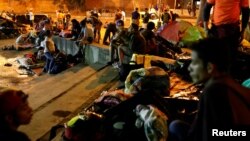Venezuelan migrant Wuendy Villamizar fled Venezuela by foot while seven months pregnant to ensure she gave birth in Colombia.
Her infant son was born healthy at a border hospital earlier this year but has gone without one of the most basic human rights: Citizenship.
That changed Monday when President Ivan Duque announced that his government will grant citizenship to babies like Santiago Josue who were born to Venezuelan parents in Colombia and are at risk of statelessness. The measure is expected to benefit more than 24,000 Venezuelan kids.
Villamizar is still overwhelmed trying to provide for her family while living in Colombia without any legal status herself, but knowing that her youngest will be entitled to the same rights as any other citizen came as a relief to the 26-year-old mother of three.
"My son is going to have his citizenship, at least," she said.
Duque hailed the resolution as a sign of solidarity with the hundreds of thousands of Venezuelans who continue to flee a political and economic crisis. More than 1.4 million Venezuelans are now residing in the neighboring Andean nation, more than any other country.
"Today we support these defenseless children who want to have the right to a nationality and proudly tell them that they are Colombian," Duque said during a ceremonial signing at the presidential palace while surrounded by members of his Cabinet.
Colombia's laws still prohibit children born to foreign parents in the country illegally from accessing birthright citizenship. Statistics from Colombia's migration agency show some 47% of Venezuelans living in the country lack legal status. That does not include an estimated 500,000 Venezuelans of Colombian origin who have now returned.
Children born to Venezuelan parents abroad have a right to Venezuelan citizenship, but it has become nearly impossible for many to obtain. Venezuela severed diplomatic ties with Colombia and no longer operates any consulates inside the country. While parents could return to Venezuela to seek their child's citizenship, many are reluctant to travel back.
Babies born in Colombia have previously been given birth certificates, but they clearly state, "Not valid for citizenship."
If the children were to remain stateless, they would be unable to travel internationally, buy a home, have a legal job or marry later as adults.
"They were caught in a limbo," said Marianne Menjivar, Colombia country director for the nonprofit International Rescue Committee.
Under the new framework, children born to Venezuelan parents in Colombia on or after Aug. 19, 2015 will have the right to citizenship. The measure is slated to take effect for two years or until ``the circumstances impeding the registration of boys and girls as Venezuelans cease.''
The issue has not surfaced in several other South American nations receiving large numbers of Venezuelans, including Peru, because existing laws allow babies born in the territory to obtain citizenship regardless of their parents' migration status.
Under several international accords, Colombia is required to provide citizenship to those at risk of statelessness. Civil rights and migrant advocacy groups have been pressuring Colombia's government to comply with such treaties for several months.
The United Nations praised the new resolution.
"The decision represents a great advance in guarantees for children's rights," the organization said.
According to the U.N., over 4 million Venezuelans have now fled their nation in an unprecedented exodus putting stress on nations around Latin America. In response to the crisis, Duque said Colombia has administered 1.2 million vaccines and enrolled more than 182,000 children in school.
But migrants like Arelys Pulido say they've frequently encountered obstacles when it comes to getting their children education and health care.
When her daughter recently came down with a cough, she tried to get her treated at a hospital in central Colombia where her family now resides. Her baby was born in Colombia but like others hasn't yet gotten citizenship status.
"No, no, no," Pulido said she was told. "You all are Venezuelan."
She was eventually able to get her daughter treated but was told she'd have to cover the entire cost of the doctor's appointment and the medicine. Pulido and her husband are both in the country illegally and struggling to afford basics like housing.
Migration director Christian Kruger said that while the new resolution doesn't provide Venezuelan parents any legal status, it could nonetheless help them down the line, as many will qualify for a beneficiary visa given to those with Colombian children.
But Lucia Ramirez, coordinator for investigations and migration issues at the human rights nonprofit Dejusticia, said that the resolution doesn't go far enough.
She noted that children born before the resolution's retroactive start date or whose parents are undocumented migrants of other nationalities will be left out. Ramirez said two pending Constitutional Court cases could have a broader impact.
"It's positive in that the government recognizes there is a risk of statelessness," she said. "But it worries me that it doesn't resolve the problem for everyone."
Villamizar, the mother of three, decided to give birth in Colombia because she knew she would need a C-section and the nearest hospital in Venezuela required patients to buy the special surgical tools needed for the procedure, which she couldn't afford.
So she journeyed on foot and by canoe through one of the dozens of illegal crossings into Colombia, many of which are controlled by armed groups.
"I was afraid," she said. "But I had to do it - for my future and the baby's."
While her teenage brother now helps her buy diapers and food, she hasn't been able to find work. Most employers ask for a passport, which she doesn't have.
The news that at least her infant will be able to get citizenship came as a welcome surprise.
"Thank God," she said. "This makes me very happy."




